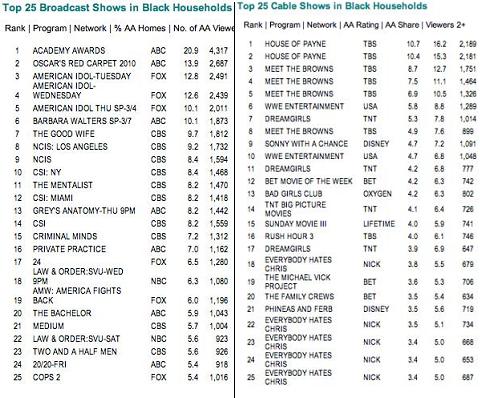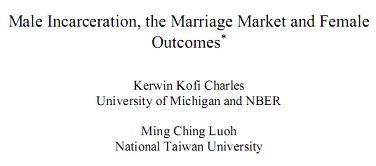April 15, 2010
Why Is It So Hard To Find A Good Black Man To Marry?

uh oh
Prologue here.
I.
From The Economist:
1 in 9 black men in their 20s is in jail. And only a third of black women 30-44 are married. The study, Male Incarceration, The Marriage Market, and Female Outcomes, from which the above hypothetical is drawn estimates that for every percent of incarcerated men, there's a 2.4% drop in marriage rates.
You might say that the educated black women are not likely to marry the kind of men who are being incarcerated. Maybe, but besides the point: the key statistic is that 96% of black women marry black men, and if 10% are in jail, well, what is she supposed to do?
II.
Actually, it's not besides the point, it is the point. Other studies have tried to correlate the quality of eligible men to the overall marriage rate-- i.e. where are all the "good" black men? (Un)Surprisingly, they have mostly found little overall effect, with no explanation. In a normally functioning economy with a dwindling supply, women would be predicted to... settle. But the marriage rate would be high.
This paper is unique, however, because it correlates the actual number of men-- indeed, men precisely not high on the list of choice mates. Their absence has an effect not on the women, but on the men. There's less incentive to try harder. Or try at all.
Here's the missing sentence from The Economist quote:
III.
Do I need to bring up the fact that a lot of (black) people spend months, sometimes years, in jail-- pre trial? Only to have a bench trial with a public defender who does not know their name, and who urges them to take the plea with time served?
IV.
Here's an illustrative example: 70% of black babies are born out of wedlock. They're obviously not all sired by inmates, so how does this happen? According to the study, the decreased pool of men- any men-- means the ones left become more valuable independent of their actual "quality" (as defined by behavior eligibility, etc.)
V.
There's also the problem of contagion. A black baby may be born into a loving set of educated parents, but what is the effect of simply knowing that a close relative-- say an uncle-- has been in the joint? Or, more commonly, that there are female relatives who have no choice but to raise a child on their own; and there are male relatives who don't have to live with their kids?
When a parent does something, it makes that action a potentiality in the world of the child. A parent who publishes a book-- even one that no one ever reads-- has, at least, placed writing a book into the range of possibilities. It works both ways.
A.
Behavioral economics is so much fun because by reducing the human condition to the impulses of inanimate objects, or at best rhesus monkeys, you get to ignore all that confusing stuff, like pornography, and its obviously non-existent effect on human desires. "They were maximizing a utility function!" And how.
Anyone else a little nervous about reducing black men to a commodity with binary utility? No? Just me? Sweet.
B.
If you didn't like that thought, you're going to hate this one: why does the black female doctor quoted above think she's "a catch?" Don't yell at me, all Glocks down-- what makes her a catch?
Because she's a doctor? But I don't know (m)any white women who think being a doctor increases their chances of finding a husband, makes them more appealing. Go over to the med school and ask the women what they think they're doing to their marrigeability. "A lot of men don't want a woman who's away all the time." "They're threatened." Or, my personal favorite: "oh my god, all they want are the nurses."
The answer is that since black women have been able to take on the very qualities they want in a man, they assume that the men would value these things in the same way. You may need to revisit that assumption.
C.
You may not be interested in TV, but TV is certainly interested in you. If black men of a certain type are taking their cues from media images, it's safe to assume the same for women. Right?
So what do we have? The unique, mandatory role for all black female personalities-- from Oprah to Wanda Sykes-- is to say "oh no you didn't" and move her neck back and forth sideways. Each woman may do it to varying degrees, and they are certainly allowed to do other things, but it is mandatory that they "keep it real" at least once per broadcast.
For fiction-- always more powerful-- we have: the spectrum of hoes in music videos; there's the strong, quietly suffering, approaching middle age and beyond, and, of course, solitary black woman; and the educated and attractive black woman-- wherein "educated" is a descriptive proxy for "controlling" or "insane bitch." Something on the order of Why Did I Get Married Too?- let's-break-some-shit-because-he-lied bananas.
Let's say that media portrayals of "educated black women that can't get a man to commit"-- that's a brand-- storming over to his job and smashing things because of alleged infidelity does NOT make real women more likely to do this themselves. Fine. What I am certain it does do, however, is make that behavior less terrifying to black men. "Oh well, that's just what they do. She'll get over it."
The First Lady isn't any of these stereotypes, but suffers from the problem of being an actual person and not on CSI or a reality show, and thus can't be a role model. Sorry, I don't make the rules. So young girls can choose between Anita Van Buren or Omarosa. I'll say what you're all thinking: yikes.
 ...they're just like us?...
...they're just like us?...
But aren't the black women in prime time strong and noble, even if there are only four types? On every medical drama on TV-- ER, Private Practice, Grey's, etc-- the only attractive, well educated females who aren't serially bedding/flooring men with Wicked rapidity are the black women. Every week, the black women struggle with/over the same man; and those men are always the best at what they do, the chiefs, the leaders. At some point, the men inevitably fall for a white woman. Not permanently, of course; nothing is permanently on TV.
Unfortunately for black women, these shows are scripted by white women. If black girls are watching TV, then they're getting their options from white women. The message is: our lot is to have a series of chaotic relationships in the search of a non-existent ideal; yours is to suffer over one.
IV.
The cycle-- for blacks and whites-- only ever gets broken in one of two ways. One is that this generation grows old and dies, and the next one gets its shot.
The second is that generation 1 stops raising generation 2 by proxy. Accept that what you do is more important than who you tell them you are. "I'm taking you to church right after I finish yelling at your mother." Ok, Dad. I'll be in the car.
V.
If a paucity of black men cause women to "up their game," settle, and be alone; and men to assume a cavalier, non-committal posture, one might ask what happens to a society with too many men.
Apparently, not the opposite. Why hasn't it become true that Chinese women are protected, elevated, catered to? That Chinese men have to "up their game" or settle?
It's an interesting question, one that will likely require a Chinese academic researcher to perform a similar study in her own country on her own people.

I.
From The Economist:
Imagine that the world consists of 20 men and 20 women. Since the numbers are even, everyone can find a partner. But what happens if you take away one man? You might not think this would make much difference. You would be wrong... With 20 women pursuing 19 men, one woman faces the prospect of spinsterhood. So she ups her game. Perhaps she dresses more seductively. Perhaps she makes an extra effort to be obliging. Somehow or other, she "steals" a man from one of her fellow women. That newly single woman then ups her game, too, to steal a man from someone else. A chain reaction ensues...
1 in 9 black men in their 20s is in jail. And only a third of black women 30-44 are married. The study, Male Incarceration, The Marriage Market, and Female Outcomes, from which the above hypothetical is drawn estimates that for every percent of incarcerated men, there's a 2.4% drop in marriage rates.
You might say that the educated black women are not likely to marry the kind of men who are being incarcerated. Maybe, but besides the point: the key statistic is that 96% of black women marry black men, and if 10% are in jail, well, what is she supposed to do?
II.
Actually, it's not besides the point, it is the point. Other studies have tried to correlate the quality of eligible men to the overall marriage rate-- i.e. where are all the "good" black men? (Un)Surprisingly, they have mostly found little overall effect, with no explanation. In a normally functioning economy with a dwindling supply, women would be predicted to... settle. But the marriage rate would be high.
This paper is unique, however, because it correlates the actual number of men-- indeed, men precisely not high on the list of choice mates. Their absence has an effect not on the women, but on the men. There's less incentive to try harder. Or try at all.
Here's the missing sentence from The Economist quote:
A chain reaction ensues.Before long, every woman has to try harder, and every man can relax a little.
III.
Do I need to bring up the fact that a lot of (black) people spend months, sometimes years, in jail-- pre trial? Only to have a bench trial with a public defender who does not know their name, and who urges them to take the plea with time served?
IV.
Here's an illustrative example: 70% of black babies are born out of wedlock. They're obviously not all sired by inmates, so how does this happen? According to the study, the decreased pool of men- any men-- means the ones left become more valuable independent of their actual "quality" (as defined by behavior eligibility, etc.)
"I thought I was a catch," sighs an attractive black female doctor at a hospital in Washington, DC. Black men with good jobs know they are "a hot commodity", she observes. When there are six women chasing one man, "It's like, what are you going to do extra, to get his attention?" Some women offer sex on the first date, she says, which makes life harder for those who prefer to combine romance with commitment.
V.
There's also the problem of contagion. A black baby may be born into a loving set of educated parents, but what is the effect of simply knowing that a close relative-- say an uncle-- has been in the joint? Or, more commonly, that there are female relatives who have no choice but to raise a child on their own; and there are male relatives who don't have to live with their kids?
When a parent does something, it makes that action a potentiality in the world of the child. A parent who publishes a book-- even one that no one ever reads-- has, at least, placed writing a book into the range of possibilities. It works both ways.
A.
Behavioral economics is so much fun because by reducing the human condition to the impulses of inanimate objects, or at best rhesus monkeys, you get to ignore all that confusing stuff, like pornography, and its obviously non-existent effect on human desires. "They were maximizing a utility function!" And how.
Anyone else a little nervous about reducing black men to a commodity with binary utility? No? Just me? Sweet.
B.
If you didn't like that thought, you're going to hate this one: why does the black female doctor quoted above think she's "a catch?" Don't yell at me, all Glocks down-- what makes her a catch?
Because she's a doctor? But I don't know (m)any white women who think being a doctor increases their chances of finding a husband, makes them more appealing. Go over to the med school and ask the women what they think they're doing to their marrigeability. "A lot of men don't want a woman who's away all the time." "They're threatened." Or, my personal favorite: "oh my god, all they want are the nurses."
The answer is that since black women have been able to take on the very qualities they want in a man, they assume that the men would value these things in the same way. You may need to revisit that assumption.
C.
You may not be interested in TV, but TV is certainly interested in you. If black men of a certain type are taking their cues from media images, it's safe to assume the same for women. Right?
So what do we have? The unique, mandatory role for all black female personalities-- from Oprah to Wanda Sykes-- is to say "oh no you didn't" and move her neck back and forth sideways. Each woman may do it to varying degrees, and they are certainly allowed to do other things, but it is mandatory that they "keep it real" at least once per broadcast.
For fiction-- always more powerful-- we have: the spectrum of hoes in music videos; there's the strong, quietly suffering, approaching middle age and beyond, and, of course, solitary black woman; and the educated and attractive black woman-- wherein "educated" is a descriptive proxy for "controlling" or "insane bitch." Something on the order of Why Did I Get Married Too?- let's-break-some-shit-because-he-lied bananas.
Let's say that media portrayals of "educated black women that can't get a man to commit"-- that's a brand-- storming over to his job and smashing things because of alleged infidelity does NOT make real women more likely to do this themselves. Fine. What I am certain it does do, however, is make that behavior less terrifying to black men. "Oh well, that's just what they do. She'll get over it."
The First Lady isn't any of these stereotypes, but suffers from the problem of being an actual person and not on CSI or a reality show, and thus can't be a role model. Sorry, I don't make the rules. So young girls can choose between Anita Van Buren or Omarosa. I'll say what you're all thinking: yikes.
 ...they're just like us?...
...they're just like us?...But aren't the black women in prime time strong and noble, even if there are only four types? On every medical drama on TV-- ER, Private Practice, Grey's, etc-- the only attractive, well educated females who aren't serially bedding/flooring men with Wicked rapidity are the black women. Every week, the black women struggle with/over the same man; and those men are always the best at what they do, the chiefs, the leaders. At some point, the men inevitably fall for a white woman. Not permanently, of course; nothing is permanently on TV.
Unfortunately for black women, these shows are scripted by white women. If black girls are watching TV, then they're getting their options from white women. The message is: our lot is to have a series of chaotic relationships in the search of a non-existent ideal; yours is to suffer over one.
IV.
The cycle-- for blacks and whites-- only ever gets broken in one of two ways. One is that this generation grows old and dies, and the next one gets its shot.
The second is that generation 1 stops raising generation 2 by proxy. Accept that what you do is more important than who you tell them you are. "I'm taking you to church right after I finish yelling at your mother." Ok, Dad. I'll be in the car.
V.
If a paucity of black men cause women to "up their game," settle, and be alone; and men to assume a cavalier, non-committal posture, one might ask what happens to a society with too many men.
Apparently, not the opposite. Why hasn't it become true that Chinese women are protected, elevated, catered to? That Chinese men have to "up their game" or settle?
It's an interesting question, one that will likely require a Chinese academic researcher to perform a similar study in her own country on her own people.

49 Comments